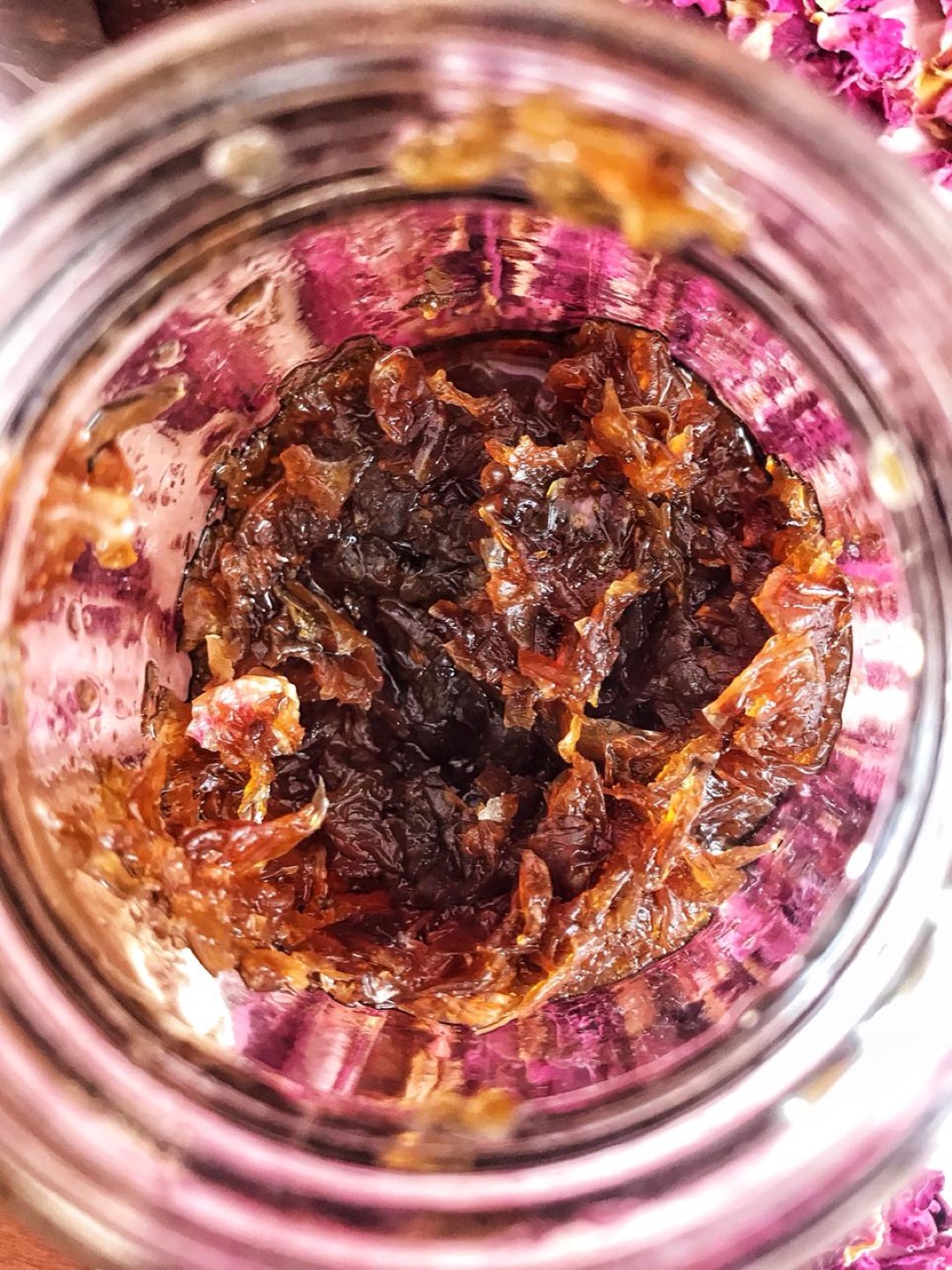
Gulkand is a traditional Ayurvedic medicine that has been used for centuries in India for its numerous health benefits. It is a sweet preserve made from fresh rose petals and sugar, infused with various aromatic herbs and spices. Gulkand is a rich source of essential nutrients, vitamins, and minerals, and it has several healing properties that make it a valuable ingredient in Ayurvedic medicine.
[ez-toc]
Ayurveda is a holistic system of medicine that originated in India more than 5,000 years ago. It focuses on balancing the mind, body, and spirit to achieve optimal health and well-being. Ayurvedic medicine uses a range of natural remedies, including herbs, spices, and plant-based ingredients, to treat various health conditions and promote overall health.
It is a popular Ayurvedic remedy that is used for several health issues, including digestive problems, respiratory disorders, and skin issues. It is known for its cooling and soothing properties, making it an excellent remedy for heat-related ailments such as sunstroke and acidity.
One of the primary benefits of Gulkand is its ability to improve digestion. It stimulates the secretion of digestive juices, which helps to break down food and improve nutrient absorption. It is also beneficial in treating constipation and diarrhea as it helps to regulate bowel movements.
It is also a powerful antioxidant and anti-inflammatory agent. It is rich in flavonoids, which are potent antioxidants that help to neutralize free radicals and protect the body against oxidative stress. Gulkand also contains anti-inflammatory compounds that help to reduce inflammation and swelling in the body.
it is also known for its cooling and soothing properties, which make it an excellent remedy for skin issues. It helps to reduce inflammation and irritation on the skin and can be used to treat acne, rashes, and sunburns. It is also effective in treating dark circles and puffiness around the eyes.
In Ayurvedic medicine, Gulkand is also used as a natural remedy for anxiety and stress. It has a calming effect on the mind and can help to reduce feelings of anxiety and promote relaxation. It is also beneficial in treating insomnia as it helps to promote better sleep.
Gulkand is a valuable ingredient in Ayurvedic medicine due to its numerous health benefits. It is a natural remedy for several health issues, including digestive problems, respiratory disorders, and skin issues. It is also a powerful antioxidant and anti-inflammatory agent and can be used to treat anxiety and stress. Gulkand is an excellent example of how traditional remedies can provide effective solutions to modern health problems.
Apart from its medicinal benefits, Gulkand is also a popular ingredient in many Indian sweets and desserts. It is often used as a filling in traditional Indian sweets such as Modak, Gulab Jamun, and Barfi. It can also be used as a topping for ice creams, custards, and puddings, adding a sweet and floral flavor to any dish.
It is not just limited to culinary and medicinal use, but it has also found its way into the world of beauty and skincare. It is a common ingredient in many natural skincare products, as it is believed to have anti-inflammatory and antioxidant properties that can help reduce wrinkles and fine lines and promote overall skin health.
Its medicinal properties and cultural significance have made it a beloved ingredient in Indian cuisine and a popular ingredient in natural skincare products. Whether you enjoy it in a traditional Indian sweet or use it as a natural remedy for digestive or skin problems, Gulkand is a versatile ingredient that is worth exploring.
What are commonly available types of Gulkand?
There are several types of Gulkand available in the market, each with its own unique qualities and characteristics. Here is a comparison of some of the most commonly available types of Gulkand on the market:
- Traditional Gulkand: This is the most common type of Gulkand, made from fresh rose petals, sugar, and a variety of aromatic herbs and spices. It is known for its sweet and floral taste and is believed to have cooling properties that can help reduce inflammation and alleviate digestive problems. It is widely available in Indian grocery stores and is moderately priced.
- Organic Gulkand: Organic Gulkand is made from organically grown roses, and the sugar used is also organic. It is believed to be of higher quality than traditional Gulkand, as it is free from harmful chemicals and pesticides. Organic Gulkand is relatively expensive compared to traditional Gulkand but is believed to be more nutritious and have better healing properties.
- Mixed Fruit Gulkand: Mixed Fruit Gulkand is a blend of traditional Gulkand with pieces of dried fruits such as mango, papaya, and pineapple. It has a unique fruity flavor and is believed to have additional nutritional benefits from the added fruits. Mixed Fruit Gulkand is widely available in Indian grocery stores and is moderately priced.
- Specialized Gulkand: There are specialized Gulkand available in the market, such as Sandalwood Gulkand, which is made from fresh sandalwood and is believed to have additional healing properties. Similarly, Amla Gulkand is made from fresh Indian gooseberries and is believed to be high in Vitamin C. These specialized Gulkand are relatively expensive compared to traditional Gulkand but are believed to have additional health benefits.
When it comes to comparing these different types of Gulkand, several factors come into play, such as price, quality, taste, nutrition, availability, and healing properties. Traditional Gulkand is the most widely available and moderately priced, making it a popular choice for everyday use. Organic Gulkand is believed to be of higher quality and has better healing properties, but it is relatively expensive. Mixed Fruit Gulkand is a unique variation that offers additional nutritional benefits but is priced similarly to traditional Gulkand.
In terms of taste, traditional Gulkand is sweet and floral, while Mixed Fruit Gulkand has a fruity flavor. Specialized Gulkand such as Sandalwood Gulkand and Amla Gulkand offer additional healing properties but are relatively expensive.
When it comes to healing properties, all types of Gulkand are believed to have cooling properties that can help reduce inflammation and alleviate digestive problems. Organic Gulkand is believed to be of higher quality and has better healing properties, while specialized Gulkand such as Sandalwood Gulkand and Amla Gulkand offer additional health benefits.
Overall, the choice of Gulkand depends on individual preferences and needs. Traditional Gulkand is a good option for everyday use, while specialized Gulkand such as Sandalwood Gulkand and Amla Gulkand offer additional health benefits. Organic Gulkand is a great choice for those who prioritize quality and nutrition, but it is relatively expensive.
How is Gulkand Made?
Gulkand, also known as rose petal jam, is a sweet delicacy made from fresh rose petals, sugar, and various aromatic herbs and spices. The process of making Gulkand is relatively simple, and here are the steps involved:
- Choose fresh rose petals: It is essential to use fresh, pesticide-free rose petals for making Gulkand. You can either buy them from a trusted source or collect them from your garden. Make sure to wash them thoroughly to remove any dirt or impurities.
- Mix the rose petals and sugar: In a clean, dry jar, add a layer of rose petals followed by a layer of sugar. Repeat this process until you have used all the rose petals and sugar. The ratio of rose petals to sugar is usually 1:1, but you can adjust it to your taste.
- Add aromatic herbs and spices: To enhance the flavor and aroma of Gulkand, you can add various aromatic herbs and spices such as cardamom, saffron, and fennel seeds. You can also add a few drops of rose water for added fragrance.
- Store the jar in a cool, dark place: Once you have added all the ingredients, seal the jar tightly and store it in a cool, dark place. It is important to keep the jar away from direct sunlight as it can spoil the Gulkand.
- Stir the mixture daily: For the first few days, you will need to stir the mixture daily to ensure that the sugar dissolves properly and draws out the moisture from the rose petals. After a few days, the mixture will start to liquefy, and the Gulkand will begin to form.
- Store the Gulkand: After a few weeks, your Gulkand will be ready. You can strain the mixture to remove any solid particles and store the Gulkand in a clean, dry jar. It can be stored for several months if kept in an airtight container and refrigerated.
Making Gulkand at home is a simple and enjoyable process, and you can experiment with different herbs and spices to create your unique flavor. Gulkand can be enjoyed on its own or used as a filling in various Indian sweets and desserts. It is also a popular ingredient in natural skincare products due to its anti-inflammatory and antioxidant properties.
[ez-toc]
How to consume Gulkand?
Gulkand, a sweet preserve made from fresh rose petals and sugar, is a popular ingredient in Indian cuisine and Ayurvedic medicine. It is known for its cooling and soothing properties and is often consumed in various ways for its numerous health benefits. Here are some popular ways to consume Gulkand:
- Gulkand mixed with milk: One of the most popular ways to consume Gulkand is to mix it with milk. Simply add a teaspoon of Gulkand to a glass of warm milk and stir well. It is a delicious and nutritious drink that can be consumed at any time of the day.
- Gulkand stuffed in a Paan: Paan is a popular Indian snack made from betel leaves, areca nuts, and various spices. Gulkand is often used as a filling for Paan, which gives it a sweet and aromatic flavor.
- Gulkand in desserts: Gulkand is a popular ingredient in Indian desserts such as Gulab Jamun, Barfi, and Kheer. It adds a unique flavor and aroma to the desserts and makes them even more delicious.
- Gulkand in smoothies and shakes: Gulkand can also be added to smoothies and shakes for a healthy and flavorful drink. It pairs well with fruits like mango, strawberry, and banana, and adds a unique twist to the drink.
- Gulkand as a spread: Gulkand can be used as a spread on toast or bread. It is a healthier alternative to regular jam and adds a sweet and aromatic flavor to your breakfast.
- Gulkand as a topping: Gulkand can be used as a topping on ice cream, yogurt, or fruit salad. It adds a unique flavor and aroma to the dish and makes it more appealing.
In Ayurvedic medicine, Gulkand is often consumed on its own as a natural remedy for various health issues. It is believed to have numerous health benefits, including improving digestion, reducing inflammation, and promoting relaxation. Gulkand can be consumed in various ways, and it is a delicious and healthy addition to your diet.
is Gulkand good for Pregnant Women?
Gulkand is a sweet preserve made from fresh rose petals and sugar, which has been used for centuries in Ayurvedic medicine for its numerous health benefits. According to Ayurveda, Gulkand is a natural coolant that can help to balance the body’s heat and reduce inflammation, making it an ideal dietary supplement for pregnant women. In this essay, we will explore the benefits of eating Gulkand during pregnancy and the potential warnings to consider.
One of the primary benefits of eating Gulkand during pregnancy is that it can help to regulate digestion. Pregnant women are often prone to digestive issues such as constipation, acidity, and bloating, which can be uncomfortable and painful. Gulkand is a natural laxative and can help to improve digestion by regulating bowel movements and reducing inflammation in the digestive tract. This can help to alleviate discomfort and prevent the development of more severe digestive issues.
Another benefit of consuming Gulkand during pregnancy is that it can help to reduce stress and anxiety. Pregnancy is a time of significant physical and emotional change, and it is not uncommon for women to experience anxiety, depression, and other mental health concerns during this time. Gulkand is believed to have a calming effect on the mind and can help to reduce stress and anxiety, making it an ideal dietary supplement for pregnant women.
Gulkand is also believed to have anti-inflammatory properties, which can help to reduce swelling and inflammation in the body. Pregnant women are often prone to swelling in the hands, feet, and legs, which can be uncomfortable and even painful. By consuming Gulkand, pregnant women may be able to reduce inflammation and alleviate swelling, which can help to improve overall comfort and quality of life.
Despite the numerous benefits of consuming Gulkand during pregnancy, there are some warnings that pregnant women should consider. First, Gulkand is high in sugar, and consuming too much sugar can lead to gestational diabetes, a form of diabetes that develops during pregnancy. Pregnant women should consume Gulkand in moderation and should consult with their healthcare provider before adding it to their diet.
Additionally, pregnant women should be cautious about consuming Gulkand which has been prepared with artificial preservatives or colors. These additives can be harmful to both the mother and the unborn child and should be avoided. It is recommended that pregnant women consume only high-quality, organic Gulkand that has been prepared using traditional methods.
Benefits:
- Gulkand is a natural coolant that can help to balance the body’s heat and reduce inflammation.
- It can help to regulate digestion by acting as a natural laxative and reducing inflammation in the digestive tract.
- Gulkand is believed to have a calming effect on the mind and can help to reduce stress and anxiety.
- It has anti-inflammatory properties that can help to reduce swelling and inflammation in the body.
Warnings:
- Gulkand is high in sugar, and consuming too much sugar can lead to gestational diabetes, a form of diabetes that develops during pregnancy. Pregnant women should consume Gulkand in moderation.
- Pregnant women should be cautious about consuming Gulkand which has been prepared with artificial preservatives or colors. These additives can be harmful to both the mother and the unborn child and should be avoided.
- It is recommended that pregnant women consume only high-quality, organic Gulkand that has been prepared using traditional methods.
- Pregnant women should always consult with their healthcare provider before adding any new dietary supplements to their diet to ensure the safety of both the mother and the unborn child.
Gulkand can be a beneficial dietary supplement for pregnant women as per Ayurveda. It can help to regulate digestion, reduce stress and anxiety, and alleviate inflammation and swelling. However, pregnant women should consume Gulkand in moderation and be cautious about the quality of the Gulkand they consume. Pregnant women should always consult with their healthcare provider before adding any new dietary supplements to their diet to ensure the safety of both the mother and the unborn child.
[ez-toc]
What are the side effects & warnings of consuming Gulkand?
It is a traditional Indian sweet made with rose petals and sugar and has been used for centuries in Ayurvedic medicine and as a culinary ingredient. While Gulkand is generally safe to consume in moderate amounts, it may cause side effects in some people.
Here are some potential side effects of Gulkand:
- Blood sugar control: Gulkand is made with sugar, which can cause a spike in blood sugar levels. People with diabetes should consume Gulkand in moderation and monitor their blood sugar levels regularly. Excessive consumption of Gulkand can lead to high blood sugar levels and increase the risk of diabetes-related complications.
- Digestive issues: Gulkand is high in sugar and may cause digestive issues such as bloating, gas, or diarrhea in some people. People with a history of gastrointestinal problems should consume Gulkand in moderation. Excessive consumption of Gulkand can lead to stomach cramps, diarrhea, and other gastrointestinal issues.
- Allergic reactions: Gulkand is made with rose petals, and people who are allergic to roses may experience allergic reactions such as itching, swelling, or hives. It is essential to consult a healthcare professional if you have any allergies before consuming Gulkand. People with a history of allergies should consume Gulkand with caution.
- Weight gain: Gulkand is high in calories and sugar and may contribute to weight gain if consumed in excess. People who are watching their weight should consume Gulkand in moderation. Excessive consumption of Gulkand can lead to weight gain and obesity-related complications.
- Dental health: Gulkand is high in sugar, which can contribute to dental problems such as cavities and tooth decay. It is important to practice good oral hygiene, such as brushing and flossing regularly and consuming Gulkand in moderation. Excessive consumption of Gulkand can lead to dental problems and tooth decay.
It is generally safe to consume in moderate amounts. However, people with diabetes, gastrointestinal issues, allergies, or those who are watching their weight should consume Gulkand in moderation. It is essential to consult a healthcare professional before consuming Gulkand, especially if you have any pre-existing medical conditions or allergies. Additionally, it is important to consume Gulkand in moderation to avoid potential side effects and to maintain a healthy and balanced diet.
Conclusion
Overall, Gulkand is an essential part of every pantry, it is not something that you binge on. however can be used regularly in moderate amounts in various desserts, smoothies, topics of pancakes, etc – as it is made from natural ingredients and as per Ayurveda, it does have healing properties.
We at MasalaMonk have our own version of Gulkand, which is well appreciated by anyone who has tried it till now, to have a look at the same, please Click Here.














